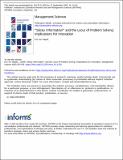| dc.contributor.author | von Hippel, Eric A | |
| dc.date.accessioned | 2020-09-11T16:31:54Z | |
| dc.date.available | 2020-09-11T16:31:54Z | |
| dc.date.issued | 1994-04 | |
| dc.identifier.issn | 0025-1909 | |
| dc.identifier.issn | 1526-5501 | |
| dc.identifier.uri | https://hdl.handle.net/1721.1/127247 | |
| dc.description | Another version of this paper is available in the Sloan Working Papers collection at https://dspace.mit.edu/handle/1721.1/2493. | |
| dc.description.abstract | To solve a problem, needed information and problem-solving capabilities must be brought together. Often the information used in technical problem solving is costly to acquire, transfer, and use in a new location—is, in our terms, “sticky.” In this paper we explore the impact of information stickiness on the locus of innovation-related problem solving. We find, first, that when sticky information needed by problem solvers is held at one site only, problem solving will be carried out at that locus, other things being equal. Second, when more than one locus of sticky information is called upon by problem solvers, the locus of problem solving may iterate among these sites as problem solving proceeds. When the costs of such iteration are high, then, third, problems that draw upon multiple sites of sticky information will sometimes be “task partitioned” into subproblems that each draw on only one such locus, and/or, fourth, investments will be made to reduce the stickiness of information at some locations. </jats:p><jats:p> Information stickiness appears to affect a number of issues of importance to researchers and practitioners. Among these are patterns in the diffusion of information, the specialization of firms, the locus of innovation, and the nature of problems selected by problem solvers. | en_US |
| dc.publisher | Institute for Operations Research and the Management Sciences (INFORMS) | en_US |
| dc.relation.isversionof | http://dx.doi.org/10.1287/mnsc.40.4.429 | en_US |
| dc.rights | Creative Commons Attribution NoDerivatives 4.0 International License. | en_US |
| dc.rights.uri | https://creativecommons.org/licenses/by-nd/4.0/ | en_US |
| dc.source | INFORMS | en_US |
| dc.title | “Sticky Information” and the Locus of Problem Solving: Implications for Innovation | en_US |
| dc.type | Article | en_US |
| dc.identifier.citation | von Hippel, Eric. "“Sticky Information” and the Locus of Problem Solving: Implications for Innovation." Management Science 40, 4 (April 1994): 429-548 © 1994 INFORMS | en_US |
| dc.contributor.department | Sloan School of Management | en_US |
| dc.relation.journal | Management Science | en_US |
| dc.eprint.version | Final published version | en_US |
| dc.type.uri | http://purl.org/eprint/type/JournalArticle | en_US |
| eprint.status | http://purl.org/eprint/status/PeerReviewed | en_US |
| dspace.date.submission | 2020-09-01T17:44:46Z | |
| mit.journal.volume | 40 | en_US |
| mit.journal.issue | 4 | en_US |
| mit.license | PUBLISHER_CC | |
| mit.metadata.status | Complete | |
